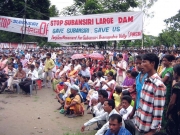/topics/sustainability
Sustainability
Documentary on mining - "Niyamgiri, You are Still Alive"
Posted on 18 Jan, 2011 02:31 PMIn 2006 Sterlite, a subsidiary of UK mining company Vedanta built a refinery in Niyamgiri Hills, Orissa, India. The intention was to mine bauxite from the Niyamgiri Hills, which is in reserved forest. It is also home to indigenous communities who are dependent on it for their livelihood.
Nominations invited for Parivartan 2011 Awards for Sustainability and Innovation in Products, Process and facilities
Posted on 12 Jan, 2011 12:55 PMParivartan Awards for Sustainability and Innovation 2011 recognize and showcase such companies that have used innovation for making their products, processes, facilities and operations sustainable.
The Parivartan Awards will be announced at Parivartan 2011, India’s only forum to focus exclusively on driving adoption for sustainability initiatives in businesses by promoting the business case with decision makers both on the production side as well as on the consumption front. It is the forum of choice to promote sustainably driven market development and innovation.
Conservation of urban lakes as potential sources of freshwater - Paper presented at the National Seminar on Water and Culture (2007)
Posted on 09 Jan, 2011 11:52 PMThe author sees the need for the conservation, maintenance and management of these ancient water bodies for the supply of water to cities. The author suggests that there is need to integrate traditional wisdom with modern water resource management.
Aquatech India 2011 - Innovative Technologies in Water Sustainability, March 02-04, 2011, Bombay Exhibition Centre, Mumbai
Posted on 06 Jan, 2011 05:11 PM Organizer:
Organizer:
- Amsterdam RAI B.V.
- Inter Ads-Brooks Exhibitions
Venue: Bombay Exhibition Centre, Mumbai
Maharashtra Groundwater (Development and Management) Bill (2009)
Posted on 05 Jan, 2011 07:32 PMThe Maharashtra Groundwater (Development and Management) Bill, 2009 aims to facilitate and ensure sustainable and adequate supply of groundwater of prescribed quality, for various category of users, through supply and demand management measures, protecting public drinking water sources and to establish the State Groundwater Authority and District Level Authorities to manage and to regulate, with community participation, the exploitation of groundwater within the State of Maharashtra.
Damming North East India - Juggernaut of hydropower projects threatens social and environmental security of region
Posted on 28 Dec, 2010 07:49 PM This report by Kalpavriksh, Aaranyak and ActionAid India deals with the large dams’ juggernaut, which happens to be the biggest ‘development’ intervention in this ecologically and geologically fragile, seismically active and culturally sensitive region in the coming days. With the Northeast identified as India’s ‘future powerhouse’ and at least 168 large hydroelectric projects set to majorly alter the riverscape, large dams are emerging as a major issue of conflict in the region.
This report by Kalpavriksh, Aaranyak and ActionAid India deals with the large dams’ juggernaut, which happens to be the biggest ‘development’ intervention in this ecologically and geologically fragile, seismically active and culturally sensitive region in the coming days. With the Northeast identified as India’s ‘future powerhouse’ and at least 168 large hydroelectric projects set to majorly alter the riverscape, large dams are emerging as a major issue of conflict in the region.
Although the current scale of dam-related developments far outstrips anything which took place in the past, the region has been no stranger to dam-related conflicts. For example, the Kaptai dam, built in the Chittagong Hill Tracts of East Pakistan (now Bangladesh) in the 1960s, submerged the traditional homelands of the Hajong and Chakma indigenous communities, and forced them to migrate into parts of Northeast India.
Blueprint for farm growth
Posted on 28 Dec, 2010 03:12 PM
Since the start of the 11th Five Year Plan, the growth rate in agriculture has virtually remained stagnant. A scene at a paddy field in the outskirts of Hyderabad.
High altitude wetland protected areas in western Arunachal Pradesh - Identification and demarcation using GIS
Posted on 27 Dec, 2010 11:15 PMGuest Post by Shashank Srinivasan
High altitude wetlands in the Indian Himalayas are crucial to the water security of downstream communities. They buffer the flow of glacial meltwater to sustain river flow in the dry season, ensuring that human settlements have access to water when they need it most.
High altitude wetlands are also reservoirs of biodiversity and contribute local livelihood opportunities. Identifying these wetlands and demarcating areas for their protection is thus crucial to any wetland management plan.
In this poster, a method of using topographic data obtained by remote sensing techniques, to identify the catchment areas of these wetlands has been described.
The author suggests that the protection of these catchment areas will ensure the survival of these wetlands, as well as of the communities that depend on them.
Guidelines for water safety plans for rural water supply systems by the Sulabh International Academy of Environmental Sanitation
Posted on 27 Dec, 2010 07:20 PMThis document by the Sulabh International Academy of Environmental Sanitation presents the guidelines for water safety plans for rural water supply systems. The revised National Rural Drinking Water Programme (NRDWP) Guidelines 2009-2012 issued by Rajiv Gandhi National Drinking Water Mission, Department of Drinking Water and Sanitation has shifted the focus from source development and installation of water supply system for providing drinking water supply to rural household to focus on development of village security plan.
Interlinking of Rivers - Third report of the Standing Committee on Water Resources (2009-2010)
Posted on 27 Dec, 2010 04:55 PMThis report of the Standing Committee on Water Resources deals with the action taken by the Government on the recommendations and observations contained in their Eleventh Report on “Inter Linking of Rivers” which was presented to Lok Sabha in October 2008.





